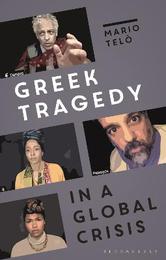
|
Greek Tragedy in a Global Crisis: Reading through Pandemic Times
Hardback
Main Details
| Title |
Greek Tragedy in a Global Crisis: Reading through Pandemic Times
|
| Authors and Contributors |
By (author) Professor Mario Telo
|
| Physical Properties |
| Format:Hardback | | Pages:296 | | Dimensions(mm): Height 234,Width 156 |
|
| Category/Genre | Literary studies - plays and playwrights |
|---|
| ISBN/Barcode |
9781350348110
|
| Audience | | Tertiary Education (US: College) | | Professional & Vocational | |
|---|
|
Publishing Details |
| Publisher |
Bloomsbury Publishing PLC
|
| Imprint |
Bloomsbury Academic
|
| Publication Date |
15 June 2023 |
| Publication Country |
United Kingdom
|
Description
What does it mean to read Greek tragedy in a pandemic, a global crisis? How can Greek tragedy address urgent contemporary troubles? One of the outstanding and most widely read theorists in the discipline, Mario Telo, brings together a deep understanding of Greek tragedy and its most famous icons with contemporary times. In close readings of plays such as Alcestis, Antigone, Bacchae, Hecuba, Oedipus the King, Prometheus Bound, and Trojan Women, our experience is precariously refracted back in the formal worlds of plays named after and, to an extent, epitomized by tragic characters. Structured around four thematic clusters - Air Time Faces, Communities, Ruins, and Insurrections - this book presents timely interventions in critical theory and in the debates that matter to us as disaster becomes routine in the time-out-of-joint of a (post-)pandemic world. Violently encompassing all pre-existing and future crises (relational, political and ecological), the pandemic coincides with the queer unhistoricism of tragedy, and its collapsing of present, past, and future readerships.
Author Biography
Mario Telo is Professor of Rhetoric, Ancient Greek and Roman Studies and Comparative Literature at the University of California, Berkeley, USA.
ReviewsGreek Tragedy in a Global Crisis is an exciting experiment in thinking with and through ancient theater and contemporary theory. It stimulates, provokes, and consoles, and will be a powerful resource for readers of all kinds. -- Joshua Billings, Professor of Classics, Princeton University, USA
|